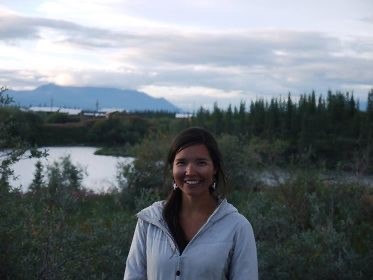Briana Tetlichi wanted to be a nurse. In her remote community of Old Crow, home to the Vuntut Gwitchin First Nation in Yukon, nurses are the primary health-care providers and a crucial thread in the fabric of the community.
“I’ve had some negative experiences where I felt judged or unheard. But I’ve also had amazing experiences where I felt like the nurses cared and made an effort to understand our community and our culture,” Tetlichi says. “Those nurses are the ones who inspired me to go into nursing and inspired the type of nurse I want to be.”
In 2020, Tetlichi completed her Bachelor of Science in Nursing at Thompson Rivers University (TRU) and returned to Old Crow to live and work, serving a fly-in community she uniquely understands.
On December 10, 2020, BMO Financial Group announced a donation of $750,000 to TRU that will support more students like Tetlichi by funding scholarships, bursaries and awards for Indigenous health-care students and undergraduate researchers. The gift is a significant investment in Indigenous learners, who represent 10 percent of TRU’s student population.
“We are grateful that BMO has dedicated this funding to advance the work Indigenous students are doing to achieve at their highest potential,” says TRU President and Vice-Chancellor Brett Fairbairn. “As a university, we have a responsibility in reconciliation. That includes honouring our relationship with the Secwépemc people on whose lands we reside, reducing barriers to post-secondary education and ensuring our learning community is a place where everyone truly belongs. Today’s announcement creates more opportunities for Indigenous learners to succeed.”
BMO is dedicating $400,000 to student awards for the Knowledge Makers, an award-winning mentorship program that guides Indigenous researchers starting at the undergraduate level. A second set of awards totalling $350,000 for the School of Nursing will support Indigenous students across various nursing and health-care assistant programs in Kamloops and Williams Lake. The donation contributes to TRU’s Limitless campaign to raise $50 million, pushing the total beyond $46 million to date.
“BMO values its long relationship with TRU. We are honoured to support Indigenous students through scholarships and awards. Education is one of the three pillars of BMO’s commitment to Indigenous communities,” says Paul Seipp, head of Business Banking, Western Canada, BMO Financial Group. “Our actions and progress against these pillars and the Truth and Reconciliation Commission Call to Action 92, are guided by our Indigenous advisory council and employee Sharing Circle and continue to be a priority for BMO.”
Tomorrow’s knowledge makers
The Knowledge Makers is an Indigenous student research network that involves TRU faculty, staff, deans and Elders working together to mentor Indigenous students in learning to conduct and publish Indigenous research. It was introduced in 2015 and recognized with a national teaching excellence award in 2019 for its commitment to Indigenous-led research.
Tia Stanley studied her own identity as a knowledge maker in 2020, while completing her Bachelor of Social Work. She grew up away from her ancestral community— the Saulteaux of the Cote First Nation. Through the Knowledge Makers, she learned who she is as an Indigenous woman, producing research on her identity and struggle as someone who is part Indigenous, part settler and part Chinese.
“The money put toward Indigenous students and their ability to bring their lived experience of their Indigenous culture to the academic world increases the wealth of knowledge at TRU,” Stanley says. “It places value on Indigenous ways of learning. It’s about creating space and opportunity for Indigenous students to show what they already know.”
The Knowledge Makers brings together up to 15 Indigenous undergraduate students yearly, each of them publishing a research paper in the Knowledge Makers academic journal, now in its fifth edition. BMO’s awards will help students like Stanley fund their education.
“It’s a space where people can see your potential in a place that’s not typically for you,” says Sandra Bandura, associate director of the All My Relations Research Centre and a Knowledge Makers alum. “One of the most powerful lessons is learning to hold onto your voice in academia and giving you the strength to do that.”
Tomorrow’s health-care workers
When health-care providers understand the community they work with, they bring more insight into their practice to offer safe, culturally appropriate care.
“We know Indigenous people bring a rich diversity and different ways of knowing and being. When we have nurses who understand that, they are better able to integrate and advocate for their patients,” said Rani Srivastava, dean of the School of Nursing.

Tetlichi chose to study nursing at TRU in part because of Indigenous Pathways for Health Careers, which provides tailored academic support. Tetlichi also received the Cherly Zawaduk Rural Award in the fourth year of her nursing degree, a financial gift that helped her relocate to Whitehorse for her practicum.
“I’d like to say thank you to BMO for offering support to Indigenous students and investing in our success. Being an Indigenous student from a rural community, we’re learning a whole new lifestyle and culture when we go to university,” says Tetlichi.
“I think it will greatly benefit the students and our future workers and leaders. We need more Indigenous representation in all fields, especially health care, to be able to share our perspective and share our reality and get our point of view across, because there is so much work to be done to break down those barriers.”
This donation brings BMO’s contributions to the Limitless campaign to $1.35 million. In 2013, BMO donated $600,000 to support the revitalization of Old Main. Since then, TRU students have started their post-secondary journey on BMO Student Street.
For more on Limitless, visit tru.ca/limitless.
Thompson Rivers University campuses are on the traditional lands of the Tk’emlúps te Secwépemc (Kamloops campus) and the T’exelc (Williams Lake campus) within Secwépemc’ulucw, the traditional and unceded territory of the Secwépemc people. TRU’s region also extends into the territories of the St’át’imc, Nlaka’pamux, Nuxalk, Tŝilhqot’in, and Dakelh.

